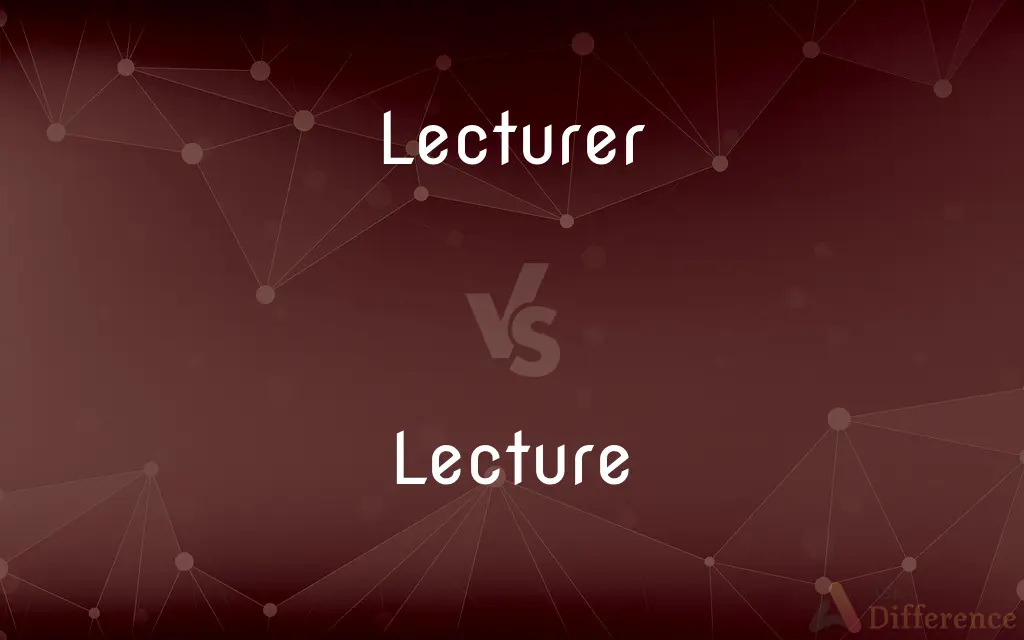Lecturer vs. Lecture — What's the Difference?
By Tayyaba Rehman — Updated on December 28, 2023
"Lecturer" refers to a person who gives lectures, usually an academic or expert, while "Lecture" is the act or instance of delivering an educational or informative speech, often in an academic setting.

Difference Between Lecturer and Lecture
Table of Contents
ADVERTISEMENT
Key Differences
Lecturer denotes the individual, often an academic, who delivers educational speeches or presentations. Lecture is the event or activity where information or knowledge is presented orally to an audience.
Lecturer is a professional title for someone who holds a position in an educational institution, primarily engaging in lecturing. Lecture refers to the method of instruction or the format of delivering educational content, often involving a monologue.
A lecturer is a person, the agent performing the action of delivering educational content. A lecture is a process or event, focusing on the content and method of delivery.
Lecturer implies certain qualifications or expertise in a subject area, along with the responsibility to educate. Lecture focuses on the act of imparting knowledge, usually in a structured and formal manner.
The term lecturer often signifies an academic rank or position within an educational institution. Lecture describes the format used in educational settings, like universities or conferences, for presenting information.
ADVERTISEMENT
Comparison Chart
Definition
A person who gives lectures
An educational speech or presentation
Context
Professional or academic role
Educational or informative event
Grammatical Usage
Noun, referring to a person
Noun, referring to an event or method
Key Focus
The individual delivering content
The content and format of delivery
Example in Academia
"The lecturer discussed biology"
"The lecture on biology was insightful"
Compare with Definitions
Lecturer
A person who delivers educational talks or presentations, typically in an academic setting.
The lecturer captivated the audience with her expertise.
Lecture
An educational talk to an audience, especially students in an academic environment.
The lecture on medieval history was thoroughly informative.
Lecturer
An academic professional specializing in delivering lectures and conducting research.
The university appointed a renowned scientist as a guest lecturer.
Lecture
A speech or talk, often public, given for educational purposes.
The public lecture on environmental conservation drew a large crowd.
Lecturer
An expert or educator who provides instructional speeches on a specific topic.
The lecturer addressed the latest advancements in artificial intelligence.
Lecture
A formal presentation of information by an expert or educator.
She attended a lecture on quantum physics.
Lecturer
A faculty member at an educational institution primarily involved in lecturing.
The lecturer in history is popular for his engaging teaching style.
Lecture
An instance of delivering instruction or information on a particular subject.
The professor's lecture on economics was well-received.
Lecturer
A speaker at educational events, conferences, or seminars.
The lecturer shared insights on climate change at the seminar.
Lecture
A method of teaching in a classroom or academic setting through oral presentation.
His lecture used multimedia to enhance learning.
Lecturer
Lecturer is an academic rank within many universities, though the meaning of the term varies somewhat from country to country. It generally denotes an academic expert who is hired to teach on a full- or part-time basis.
Lecture
A lecture (from the French lecture, meaning reading) is an oral presentation intended to present information or teach people about a particular subject, for example by a university or college teacher. Lectures are used to convey critical information, history, background, theories, and equations.
Lecturer
One who delivers lectures, especially professionally.
Lecture
An exposition of a given subject delivered before an audience or class, as for the purpose of instruction.
Lecturer
A member of the faculty of a college or university usually having qualified status without rank or tenure.
Lecture
An earnest admonition or reproof; a reprimand.
Lecturer
A faculty member ranking below an assistant professor.
Lecture
To deliver a lecture or series of lectures.
Lecturer
The academic rank held by such a faculty member.
Lecture
To deliver a lecture to (a class or audience).
Lecturer
Chiefly British A university teacher, especially one ranking next below a reader.
Lecture
To admonish or reprove earnestly, often at length
Always lecturing me about my manners.
Lecturer
A person who gives lectures, especially as a profession.
Lecture
A spoken lesson or exposition, usually delivered to a group.
During class today the professor delivered an interesting lecture.
Lecturer
A member of a university or college below the rank of assistant professor or reader.
Lecture
(by extension) a class that primarily consists of a (weekly or other regularly held) lecture (as in sense 1) [usually at college or university]
We will not have lecture tomorrow.
Lecture notes are online.
Lecturer
(dated) A member of the Church of England clergy whose main task was to deliver sermons (lectures) in the afternoons and evenings.
Lecture
A berating or scolding.
I really don't want you to give me a lecture about my bad eating habits.
Lecturer
One who lectures; an assistant preacher.
Lecture
(obsolete) The act of reading.
The lecture of Holy Scripture
Lecturer
A public lecturer at certain universities
Lecture
(ambitransitive) To teach (somebody) by giving a speech on a given topic.
The professor lectured to two classes this morning.
Lecturer
Someone who lectures professionally
Lecture
(transitive) To preach, to berate, to scold.
Emily's father lectured her about the importance of being home before midnight.
Lecture
The act of reading; as, the lecture of Holy Scripture.
Lecture
A discourse on any subject; especially, a formal or methodical discourse, intended for instruction; sometimes, a familiar discourse, in contrast with a sermon.
Lecture
A reprimand or formal reproof from one having authority.
Lecture
A rehearsal of a lesson.
Lecture
To read or deliver a lecture to.
Lecture
To reprove formally and with authority.
Lecture
To deliver a lecture or lectures.
Lecture
A speech that is open to the public;
He attended a lecture on telecommunications
Lecture
A lengthy rebuke;
A good lecture was my father's idea of discipline
The teacher gave him a talking to
Lecture
Teaching by giving a discourse on some subject (typically to a class)
Lecture
Deliver a lecture or talk;
She will talk at Rutgers next week
Did you ever lecture at Harvard?
Lecture
Censure severely or angrily;
The mother scolded the child for entering a stranger's car
The deputy ragged the Prime Minister
The customer dressed down the waiter for bringing cold soup
Common Curiosities
Can anyone be a lecturer?
Typically, lecturers have expertise or academic qualifications in their field.
Do lecturers only work in universities?
Primarily, but they can also work in other educational or research institutions.
Is a lecture always in an academic setting?
Mostly, but lectures can also occur in non-academic settings like public forums.
Is a lecture always formal?
Lectures are usually formal, but styles can vary depending on the setting and audience.
Can lectures be delivered online?
Yes, especially in modern educational contexts.
Are lectures only for students?
They are often targeted at students, but anyone interested can attend.
Can lecturers be part-time?
Yes, there are part-time lecturers.
Is a lecture always a solo activity?
Typically, but there can be joint lectures or panel discussions.
Are all lecturers involved in research?
Many are, but it depends on their role and institution.
Are all professors lecturers?
Most professors do lecture, but the title "lecturer" can be a specific academic rank.
Can a lecture be interactive?
Yes, some lectures involve audience participation or Q&A sessions.
Does a lecture have to be long?
Not necessarily; lecture lengths can vary.
Do lecturers need special certification?
It depends on the institution and country, but usually advanced degrees are required.
Do all academic courses involve lectures?
Not all, but lectures are a common teaching method in higher education.
Can lecturers teach subjects outside their expertise?
Generally, they teach within their area of expertise.
Share Your Discovery

Previous Comparison
Pleasant vs. Sweet
Next Comparison
Grit vs. GrimeAuthor Spotlight
Written by
Tayyaba RehmanTayyaba Rehman is a distinguished writer, currently serving as a primary contributor to askdifference.com. As a researcher in semantics and etymology, Tayyaba's passion for the complexity of languages and their distinctions has found a perfect home on the platform. Tayyaba delves into the intricacies of language, distinguishing between commonly confused words and phrases, thereby providing clarity for readers worldwide.
















































